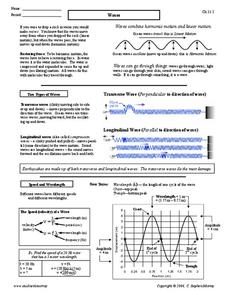Curated OER
Color at Light Speed
Rainbow science anyone? learners put the color specturm, frequency, light waves, and wavelengths into a light speed context. They use algebraic formulas to determine the speed of each light wave length. A great way to connect math and...
Rhythm Rhyme Results
Whatʼs the Same and Whatʼs Different?
Learn about radiation, convection, and conduction with a multiple choice worksheet. Each question prompts kids to decide what is different about each form of heat energy transfer, and what is the same.
Curated OER
Typical Numeric Questions for Physics I - Waves
Physics masters figure out the wavelength of different waves. Looking at a wave graph, they identify different characteristics. Many more problems get them working with both electromagnetic and sound waves. There are a total of 17...
Curated OER
Typical Numeric Questions for Physics I - Photoelectric Effect
As the title implies, here is a collection of typical photoelectric effect problems that physics learners need to be able to solve. They determine the amount of energy of a photon, the photons produced per second, the frequency required...
Teach Engineering
Thirsty for Gold
In the last portion of the six-part unit, teams perform an experiment with gold nanoparticles to determine which sport drink has the most electrolytes. The nanoparticles are used as chemical sensors and fluoresce in different wavelengths...
Curated OER
Find the Mystery Lines...If You Can!
In this atomic spectral lines worksheet, students observe a diagram of the spectral lines, their different wavelengths and their intensity. They solve 4 problems which include interpreting the scale, matching up tabulated lines with the...
Teach Engineering
Quantum Dots and Colors
Introduce teams to quantum dot solutions with an activity that has them expose solutions to a blacklight, observe the colors, and take measurements. Groups graph the data and analyze the dependence between particle size and...
Curated OER
Measuring Star Temperatures
In this measuring star temperatures, students find the temperature of a star using Planck's curve and the Wein Displacement law. Students also find the peak wavelengths for given stars using Planck's curve.
Curated OER
Waves
In this waves worksheet, students read about harmonic and linear motion in waves as well as the two types of waves. They match 5 terms to their definitions about the structure of waves, they solve for the wavelength, frequency and...
Curated OER
Waves
In this waves worksheet, students read about the different types of waves and how the speed of waves is calculated. Then students complete 5 matching, 8 fill in the blank, and 9 short answer questions.
Curated OER
Find The Other Half
In this science worksheet, students interpret the graphs for the information that is related to measuring the different wavelengths for light or sound.
PBS
Electromagnetic Spectrum | UNC-TV Science
Illuminate lightwaves, even those not visible to the human eye, in a concise activity about the electromagnetic spectrum. Pupils watch and listen to an animated video describing the electromagnetic spectrum as well as frequency and...
Curated OER
Why Are Hot Things Red?
In this radiation and temperature worksheet, students use 2 methods to derive the Wein Displacement law that shows the relationship between the temperature of a body to the frequency where the Planck curve's value is at its maximum....
Curated OER
Calculating Wave Speed
In this wave speed worksheet, students will learn how to calculate the speed of waves by dividing the wavelength by the period. Students will then calculate wave speed for 7 different examples.
Curated OER
Worksheet 4-1 Atomic Spectra
In this atomic spectra worksheet, students answer eighteen questions about wavelengths of light, the emission spectrum, energy of photons, the frequency of electromagnetic radiation and electrons in the excited state.
NASA
Taking Apart the Light
Break down light into spectra. Scholars learn how atoms emit and absorb photons and come to understand how this process allows scientists to identify different atoms based on either absorption lines or emission lines. Learners then...
Curated OER
Raven Chapter 10 Guided Notes: Photosynthesis
Kim B. Foglia has designed a comprehensive series of AP biology worksheets. This one focuses learners on the progression of photosynthesis in plants. In this assignment, they identify structures and steps on high-quality diagrams, use...
Weebly
Definitions of Conduction, Convection, and Radiation
There's quite a bit in this physical science packet. First, how is heat transferred? Learners read a brief explanation of conduction, convection, and radiation before identifying common occurrences (with pictures) as one of the three....
NASA
Taking a Cold, Clear Look at the Universe
Take a look with another perspective. Pupils read to find out what portion of the electromagnetic spectrum a space telescope sees and the difficulties of viewing infrared radiation from other objects in space. Individuals discover how...
Curated OER
Properties of Light
In this light waves worksheet, students will measure the wavelength of different light waves and then calculate its frequency. This worksheet has 9 short answer questions and 10 fill in the blank questions.
Curated OER
Wave Terms and Concepts
In this waves worksheet, students define 23 vocabulary words associated with the different types of waves and how waves are measured. Students complete 23 matching terms with definitions and draw the superposition of two waves shown.
Curated OER
More About Electromagnetic Waves
In this electromagnetic waves worksheet, students compare the wavelengths of different types of electromagnetic waves. This worksheet has 5 short answer questions.
Curated OER
AP: Chapter 10: Photosynthesis
AP biologists or college-level botanists consider in-depth details of the photosynthetic process. They examine the structures in a leaf and the roles that they play. They label neat and colorful diagrams of photosystems and electron...
Curated OER
Starlight, Star Heat
In this stars worksheet, students read how astronomers calculate the temperature of a star by measuring its color. Students use a chart showing star temperatures and colors to complete 3 short answer questions.























